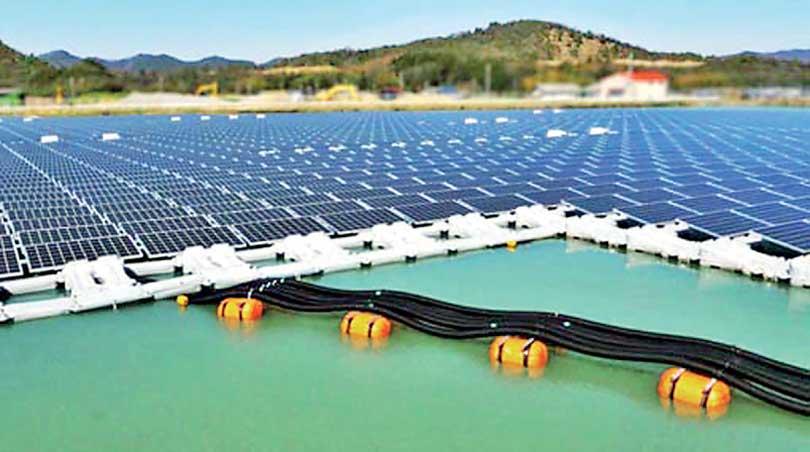Reply To:
Name - Reply Comment

In the above captioned news item, appearing in your issue of 29th Jan.’21, it is reported, the Minister for Irrigation, State Defence, and Home Affairs Chamal Rajapaksa has declared a gigantic project to install floating solar panels in the Mahaweli including reservoirs Victoria and Randenigala to generate power would be implemented soon. In view of global concern on climate change and our precarious situation of energy shortage, due to cancellation of Coal Power generation, and the pompous or imaginary idea of supplying electricity to India and far away Singapore, this proposal is acceptable. But have the authorities who advise the government or politicians themselves taking decisions on their own, without any knowledge of the subject considered the negative aspects of floating solar panels in reservoirs, in a small island as ours with a population of 21 million. Here I would wish to quote an authority on the subject, George L Clarke, Biological Laboratories, Howard University –“Light is a limiting factor for aquatic plants and animals. Every school boy knows that light is required for the growth of green plants and that all animals, including ourselves, depend directly or indirectly upon the plants for their food supply. It is not so obvious however, that exactly that the same situation is encountered in the aquatic habitat. The ultimate source of energy for all multifarious life in the sea and in every body of fresh water is sunlight. Furthermore, most fish and many types of animals need enough illumination to see, at least part of the time – to catch their food, to avoid being caught themselves. But light does not penetrate into the water indefinitely, it is absorbed by the water itself and further reduced by sediment and stains. The aquatic biologist is thus concerned to know how much light exists in various depths in rivers, ponds, lakes and in the ocean itself, and what are the maximum depths at which the fish can see and at which the all-important green plants make a living”
Apart from aquatic life, there are other aspects to be given serious thought, such as inland freshwater fishing, a trade and livelihood of the villager and a nourishment for healthy living, water sports to attract tourists and also landing of amphibian planes. The advantages cited by those advocating Solar energy are those concerned only on energy and saving of 20% of water through the prevention of evaporation, which will help farmers and hydropower generation. The negative factor which should be given due consideration is that vaporized water not rising from reservoirs, lakes, ponds and rivers, will the rainfall in catchment areas fail and will the weather pattern be subject to change?. If so, what was gained in saving 20% of water in reservoirs will be lost if the rains fail in these areas, or reduced.
Speaking on Solar Energy in general is that when calculating the land area needed for a solar power panel installation on land, it is said that one megawatt plant requires approximately four acres when using crystalized technology. When using thin-film technology, one megawatt plant will require four to five acres of land. In other terms, each kilowatt of solar panel requires 100 square feet of space. As stated earlier, in this small island of ours with a land area of 65.610 km2 and the ever-increasing population, which now stands at 21 million, can we allocate such extent of land. In addition, the indigenous plant and animal will extinct as plants do not grow under solar structures, By all means encourage roof-top solar panels and offer incentives. One other factor is that Solar power generation is subjected to weather patterns due to cloudy and rainy days as rightly pointed out by the former General Manager, Shavi Fernando at a recent TV discussion.
It is certainly not my intention to discourage Solar Energy, but to accommodate solar panels in such a manner that the country does not suffer in other areas, such as effecting the natural habitat and displacing families. I should also state the information contained in this presentation is from news items, magazines and books written by those in the know.
With due respects and sincere apologies to Minister for Irrigation, State Defence, Disaster Management and Home Affairs Chamal Rajapaksa, this announcement, in my understanding, should have been rightly made by the Minister for Energy Udaya Gammanpila or Minister for Power, Gamini Lokuge, under whom comes the State Ministry for Solar and Renewable Sources of Energy. I feel sorry, I would not have made this unpleasant remark, if only the two subjects Power and Energy, came under one Ministry as they were from known times
G.A.D.Sirimal
SLAS
Retd. Asst. Secretary.
Ministry for Power and Energy